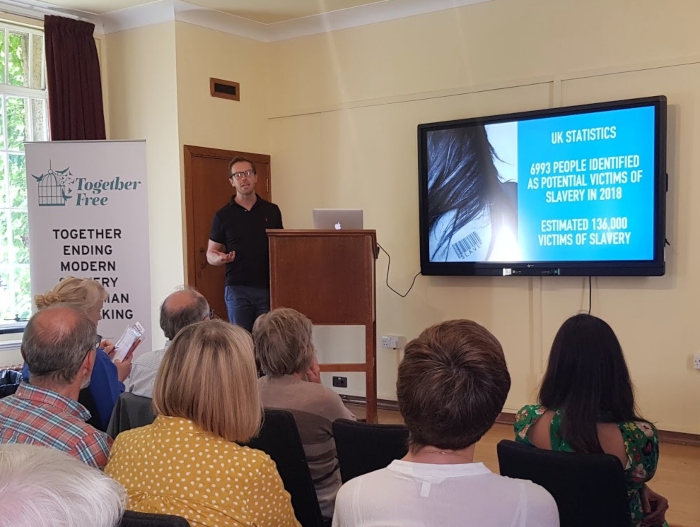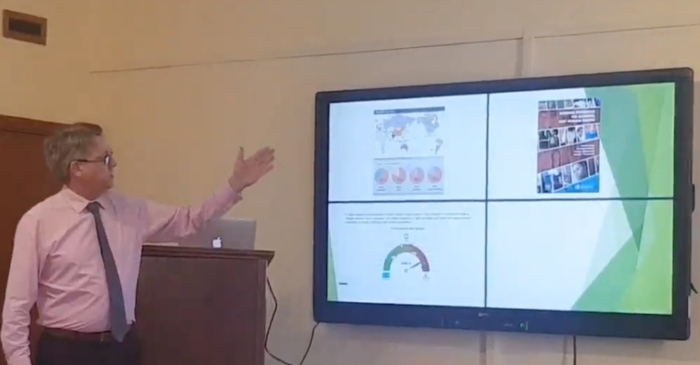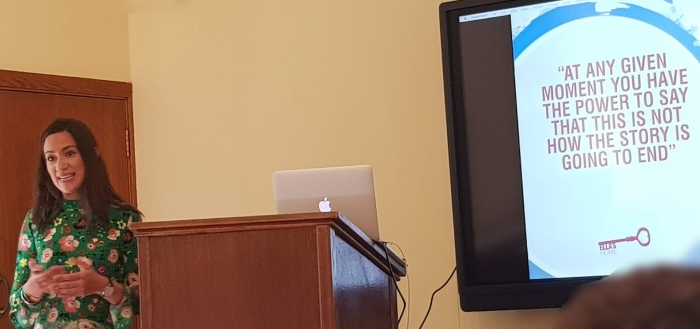Working to end Modern Slavery
It is thought at least a fifth of Baptist churches have been in contact with people who have been survivors of modern slavery in their community - and it is therefore imperative that as a movement we equip ourselves to respond in appropriate ways to a growing epidemic described as a ‘stain on our lives’.

This was among the key messages at the Modern Slavery National Summits which took place in Manchester (26 June) and Oxford (27 June).
The figure was based on research among churches in the Eastern Baptist Association. Responding to a survey, 19 per cent had stated they had “knowingly been in contact with people who had experienced slavery within their community.” Extrapolating this percentage across the denomination gives around 400 churches. However, given the question used the word “knowingly”, it would suggest the number of churches unknowingly in contact with victims/survivors of modern slavery – perhaps through their foodbank, night shelter and toddler ministries – is even higher, said Baptist minister Dan Pratt.
Dan, the EBA Anti-Slavery Co-ordinator founded and leads Together Free, the new Baptist movement seeking to work with local churches to end modern slavery and human trafficking. Together Free hosted the two summits, which took place at Luther King House in Manchester and Regent’s Park College in Oxford on consecutive days last week.
Other messages to emerge consistently throughout the summits centred on the growing scale of the problem – it is now thought for every 1000 people in England, two are enslaved – the potential and imperative for people of faith to play their part in addressing the issue (and the need for good partnerships to help them do so), and the long Baptist legacy of campaigning for freedom from slavery.
'Faith groups can make a difference'
 The keynote speaker was Kevin Hyland, the former (and first) Independent Antislavery Commissioner for the UK. Kevin had been appointed to the role by Theresa May during her tenure as Home Secretary.
The keynote speaker was Kevin Hyland, the former (and first) Independent Antislavery Commissioner for the UK. Kevin had been appointed to the role by Theresa May during her tenure as Home Secretary.
Kevin gave figures to illustrate the scale of Modern Slavery. 40,300,000 people live in slavery worldwide. The official Government figure states there are 13,000 potential victims of slavery in the UK. However, the Global Slavery Index estimates that’s just a tenth of the actual figure.
Kevin spoke of instances of modern slavery in the UK which had resulted in convictions: Thai people trafficked into drugs or prostitution; Polish people trafficked to work for Sports Direct, people working in unfit conditions in hand car washes.
He stressed that Modern slavery ‘is happening everywhere’, and that ‘perhaps we don’t realise how close we are to this.’
Globally children are working in dangerous conditions in mines to extract cobalt, which is essential for our mobile phones. Recently news emerged that the company which made rubber gloves for NHS staff exploit thousands of migrants. He also cited the recent example of the Spice Girls wearing t-shirts for Comic Relief which had been made in a factory paying poverty wages.
It’s fuelled by money: trafficked people are seen as commodities and modern slavery is worth $150b globally.
Because of its scale, ‘global responsibility has never been greater,’ Kevin said.
‘It’s a stain on our lives.
‘Created by human kind – it can only be ended by human kindness.’
Kevin spoke of the importance of faith-based groups taking a responsibility. We are a divided world, and we need people to reconfigure the moral compass. Faith-based groups can help drive the change.
As people of faith, Kevin encouraged us to hold businesses, councils and Governments to account for their responses to Modern Slavery. This includes their statutory obligation as well as to ensure their policies are provision of care is person-centred and just. He stated that we must campaign for legislation that will make a difference, must make sure our victim care is of the highest standard. Together, we can all make a difference.
In an opinion piece published ahead of the recent G20 summit, Kevin expanded on the influence of faith groups, stating, 'Faith networks and organisations are often both international in scope and very local, with deep knowledge of victims and perpetrators. The on-the-ground work these organisations are engaged in to address root causes of vulnerability and provide psychosocial services to victims remains a largely untapped wealth of knowledge.' He explained to the summit how faith groups had put Modern Slavery onto the G20 agenda.
Together Free – and what churches can do
 Dan Pratt spoke in more detail of what churches can do. He emphasised the importance of partnership: partnerships not only with other churches, but those from other denominations and even other faiths committed to working towards slavery free communities.
Dan Pratt spoke in more detail of what churches can do. He emphasised the importance of partnership: partnerships not only with other churches, but those from other denominations and even other faiths committed to working towards slavery free communities.
‘There’s an opportunity for local churches,’ Dan said, ‘We are here to bring about God’s kingdom. How can we bring together local people to bring about God’s kingdom?’
One of the big questions was working out what the local problems were, and then working towards local solutions.
Dan spoke of how partnerships had developed in Southend, where he is based, between people of different churches and statutory authorities. The Southend Against Modern Slavery Partnership (SAMS) brings together local charities, faith organisations and the voluntary sector to work with law enforcement and statutory agencies. The town is also developing anti-slavery action groups.
Dan has helped to hosted more than 30 workshops to help people spot the signs of modern slavery. With Together Free, he is hoping to upscale what’s been done in Southend.
A Baptists Together modern slavery safeguarding booklet will soon be available: It will help churches think through what they can practically do if they encounter someone who is being exploited.
He highlighted a number of resources, such as the safe car wash app.
‘Together Free is an emerging network,’ said Dan. ‘We do not have a massive agenda – we just want to work toward slavery free communities.
‘There is lots to do, but I do know that we join in Jesus’ mission of setting the captives free.
‘There’s an invitation to go into the darkness. To go where Christ is.’
A local church story; Ella's Home; Baptist history of fighting slavery
The summit heard from Kim Hatton of Ruislip Baptist Church, who explained how the church had responded at a local level to Modern Slavery. They have been involved in awareness raising as well as partnering with a local safe house to support survivors of modern slavery. This includes going in weekly to meet with survivors as well as encouraging other church participants to pray and give.
 Emily Chalke spoke about the work of Ella’s Home, which provides independent long-term aftercare for women who have experienced abuse through trafficking and sexual exploitation. She explained that so many people who have been rescued will go back into exploitative situations - and the need for longer term support is really clear.
Emily Chalke spoke about the work of Ella’s Home, which provides independent long-term aftercare for women who have experienced abuse through trafficking and sexual exploitation. She explained that so many people who have been rescued will go back into exploitative situations - and the need for longer term support is really clear.
Women stay at Ella's for up to 18 months. The charity was able to open its first safe house thanks to the gift of a manse from a local church. Aside from providing the women with secure accommodation, the Ella's Home works with the women to access better accommodation, services, English, and immigration support.
Emily Burgoyne of the Angus Library and Archive presented a range of artefacts to show Baptist and free church involvement in abolition movements over the years. This included not only the role Baptists played in ending the slave trade in the cotton and sugar plantations of the West Indies, but campaigns in the East Indies and Congo.
For instance James Peggs (1793-1850), a British Baptist missionary to India, highlighted slavery in India. 'This was unusual as no one was speaking about what went on in India - it was not seen as being as harsh as in the West Indies. But an estimated more than one million people enslaved in the East Indies.'
Stories like this, and others, illustrate 'how involved Baptists and non conformists been in the fight against slavery,' Emily noted.
PhD research Joshua Findlay gave an insight into his work, arguing that our current neoliberal capitalist system feeds on low workers’ rights and wages. To effect true change, we need to change the system.
Visit Together Free to find out more about Modern Slavery.
All the talks from the Modern Slavery National Summits are now available online at the following link: togetherfree.org.uk/resources
Baptist Times, 02/07/2019